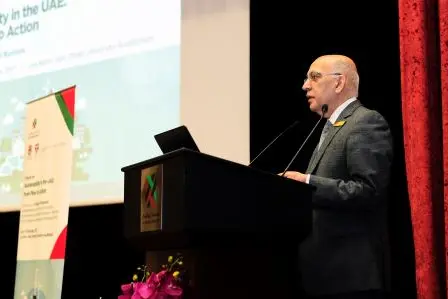PHOTO
In collaboration with University of St. Andrews & University of Birmingham
Abu Dhabi:
Around 150 professors, researchers, and industry experts who recently convened at Abu Dhabi University’s Forum on “Sustainability in the UAE: From Plan to Action” stressed the need to utilize academic expertise in through research and consultation on sustainability issues. Organized by ADU’s College of Business, in collaboration with the Centre for Social and Environmental Accounting Research- University of St. Andrews and the University of Birmingham in the UK, the Forum aimed to assert that sustainability is not the sole responsibility of collective organizations; it is also an individual duty. Discussions also highlighted the best international practices that bridge the gap between industry and academia in implementing comprehensive sustainable development plans.
Addressing the Forum, Professor Waqar Ahmad ADU’s Provost and Interim Chancellor explained that sustainability in economic, environmental, social, or cultural issues is perhaps the most pressing agenda of our times. “The United Nation’s 17 Sustainable Development Goals and their 169 targets have serious implications for every nation on earth, East and West, North and South, rich and poor, over- and under-developed. If one looks at these 17 goals, it’s clear that most if not all of these, have received great interest in the region. Since its independence, the UAE has developed at a phenomenal speed, but with today’s ever-changing economy the conditions which enabled this development no longer persist, thereby inspiring the nation’s wise leadership to think about sustainability differently, and focus particularly on resolving the challenges that face sustainable development plans. As one of the region’s world-class higher education institutions, Abu Dhabi University is playing its part in emphasizing the importance of sustainability through research, knowledge exchange and education”, said Prof. Ahmad.
He added: “In co-organizing this Forum with the University of St Andrews and the University of Birmingham, ADU confirms its commitment to establishing an educational environment of the highest quality. We use international accreditations – WASC institutional accreditation, ABET accreditation for engineering, AACSB, and EQUIS for business, among others – as important vehicles for demonstrating and enhancing the quality of our programs. And we are dedicated to undertaking research which has relevance to addressing national and regional challenges”.
On his part, Professor of Accounting and Sustainability and Head of Research in the Department of Accounting at the University of Birmingham pointed out that the United Nation’s 17 Sustainable Development Goals adopted by the General Assembly on 25 September 2015, represented a quantum leap that contributed to defining specific parameters for the concept of sustainability. He added: “These specific goals cover such a wide range of issues in a manner that made them realizable. Societies, institutions, and individuals have come together striving to implement sustainable business practices that reflect these goals. The concept of sustainability is not a modern one, in fact, it has been around for a long time. However, global progress towards achieving sustainability goals has been relatively slow. Most societies have successfully eradicated blatantly unsustainable practices but still have a long way to go and numerous challenges to overcome. Most of these challenges have clear and achievable solutions. Our role as academics is to spread awareness, create collaborative interdisciplinary research projects that resolve collective problems, and aid corporations in devising realistic implementation plans that highlight the reality of sustainability and abandon unsustainable accounting practices”.
Throughout three discussion sessions, the one-day Forum tackled the challenges that face applications of research findings on sustainability, the UAE’s sustainability policies, initiatives, case studies that highlighted current industry practices, future improvements, and how faculty can contribute to sustainable production and consumption in the UAE.
-Ends-
About Abu Dhabi University (ADU)
Abu Dhabi University (ADU), an internationally recognized university for quality education and applied research that fosters academic excellence and continued growth, was established in 2003, three years after a charter for the university as a key driver of socio-economic growth, was launched by His Highness Sheikh Hamdan bin Zayed Al Nahyan, the Ruler’s Representative in the Al Dhafra Region.
At its campuses in Abu Dhabi, Al Ain, and Dubai, ADU’s mission is to go beyond educating students and to contribute in strengthening the UAE’s global position as a progressive and innovative nation through its internationally competitive programs, world-class faculty, and educational resources. The University aims to hone the creative talent, critical thinking and leadership skills of the nation’s youth and empower them to become global leaders and lifelong learners.
Striving towards educational excellence, ADU is the first university in the country to receive the Sheikh Khalifa Excellence Award in 2010 and the first private higher education institution in the UAE and the GCC region to receive an international academic accreditation from the Western Association of Schools and Colleges (WASC). ADU’s College of Business Administration holds international accreditations from the Association to Advance Collegiate Schools of Business (AACSB) and the prestigious EFMD Quality Improvement System (EQUIS). In addition, its College of Engineering has earned the accreditation of the world renowned Engineering Accreditation Commission (EAC) and Computing Accreditation Commission (CAC) of ABET.
Dedicated to achieving excellence on all international academic levels, ADU is ranked in the top 2.8% of universities worldwide in the prestigious Quacquarelli Symonds (QS) World Universities Ranking, scoring third on the “International Faculty Index” for its faculty’s diverse cultural backgrounds, and ninth on the “International Student Index” for its international student body. Moreover, ADU also ranked in QS’s top 150 leading institutions under 50 years, and in the top 7 of all private young universities in the world, the top 3 of all private young universities in the Arab World, and the top 16 of all private universities around the world.
For media/press inquiries about Abu Dhabi University please contact:
Omnia Hassan
Public Relations & Media Officer
PO Box: 59911, Abu Dhabi, UAE
Direct: +971 (0)2 501 5624
Mobile: +971 (0)50 220 5281
Email: Omnia.hassan@adu.ac.ae
Website: www.adu.ac.ae
© Press Release 2017




















